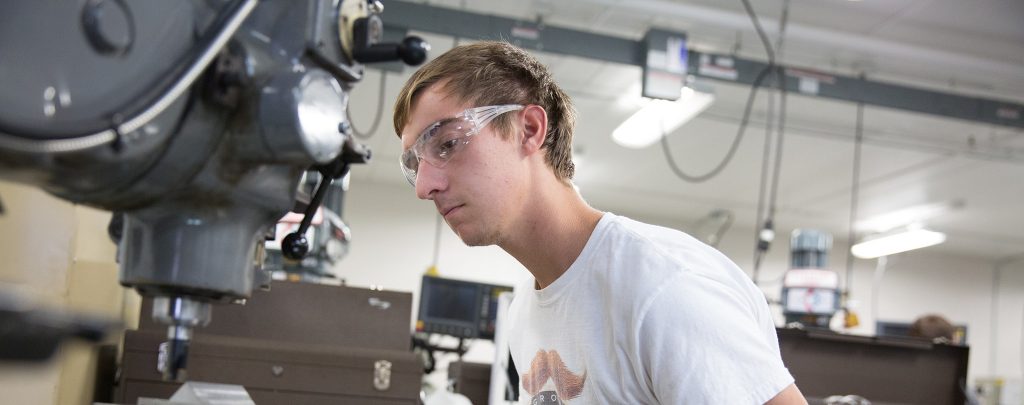Technical Diploma│2 Years│66 Credits│West Bend Campus│Eligible for Financial Aid│Fall Enrollment Only
CNC / Tool and Die Technologies Program
The use of computer numerically controlled (CNC) machine tools is increasing throughout the manufacturing industry. Moraine Park’s CNC Tool and Die Technologies diploma prepares students for an in-demand and highly-skilled career in manufacturing with the opportunity to advance quickly.
The CNC / Tool and Die Technologies program prepares students to build and run mold dies and stamping dies; and perform advanced milling, drilling and lathe work. Students also practice precision surface grinding, precision measurement, and heat treating.
Courses in the CNC/Tool and Die Technologies program focus on programming and operation of CNC machine tools, including; coordinate measuring machines (CMM), vertical and horizontal machining centers, turning centers, electrical discharge machines (EDM), tooling and work holding, as well as, three-dimensional computer-aided machining.
Upon completing the program, students will have completed all of their related training for the State of Wisconsin Tool and Die Technologies apprenticeship program.
Skilled machinists and tool and die makers are in great demand across the manufacturing industry. Workers in this field can move up as they gain experience and skills to advance their careers quickly.
What You’ll Learn
Through hands-on training, students in the CNC/Tool and Die Technologies program learn entry-level CNC machine programming, blueprint reading, two and three-dimensional computer-aided machining, computer-aided design (CAD), set up and operate molding and stamping presses, and use of high precision measuring equipment.
CNC / Tool and Die Technologies students gain hands-on experience by being involved in every phase of the manufacturing process. Students work from blueprints and CAD data to program equipment and inspect machined parts to exact tolerances.
Graduates of the CNC / Tool and Die Technologies program will have gained the necessary skills and knowledge to interpret part and material specifications, set up and operate various machine tools, use CAD/CAM software, program CNC machine tools at the machine, as well as use offline computer systems relating to a job shop or tool and die environment.
Potential careers include, but are not limited to, the following:
- CNC Operator
- CNC Programmer
- CNC Toolmaker
- CNC Setup
- CNC Machinist
- Stamping Die Maker
- Mold Maker
- Metrologist
- Jig and Fixture Maker
- CMM Operator/Programmer
Median Salary for Recent Graduates: $54,076
Graduates have advancement opportunities with additional work experience or education
Moraine Park’s admissions starts with the online application. The admissions steps and financial aid process can take 4-5 weeks for some programs, so plan ahead.
View and begin standard admissions steps.
If you have any questions or need help with the process, please contact us at admissions@morainepark.edu OR 920-924-3200, TTY/VP:Use Relay VRS.
Estimated Costs
Estimated costs below are based on the 2023-2024 school year. These fees look at the cost to complete all classes. Costs, textbooks and supplies subject to change. For more details, see Cost of Attendance.
$11,794.20
Current tuition and fees
Coming Soon
Textbooks*
$5,490.90
Materials and supplies
*Based on new books, rental, electronic, and used options may be available.
Tuition Costs
The cost of your degree depends on a number of factors such as total credits required, textbooks and the financial aid you receive. Some programs have additional costs such as uniforms, technology and equipment.
Please refer to the Tuition & Fee Information for enrollment fee information.
Cost of Attendance
Cost of attendance (sometimes referred to as the “sticker price”) is the maximum amount of money it costs to attend college for one year and is used to determine your financial aid offering.
While attending Moraine Park during the 2024-25 school year, your estimated cost of attendance for one full year includes tuition of $4,462 (15 credits for fall and spring semester), fees of $338, food and housing of $3,008 (if living with parents, $9,147 if living on your own), books and supplies of $1,465, personal expenses of $3,608, and transportation of $4,017 for a total of $17,002. Your direct costs (those costs paid directly to the college) include tuition & fees. The indirect costs (costs not paid to the college) can vary from individual to individual and your own personal needs.



